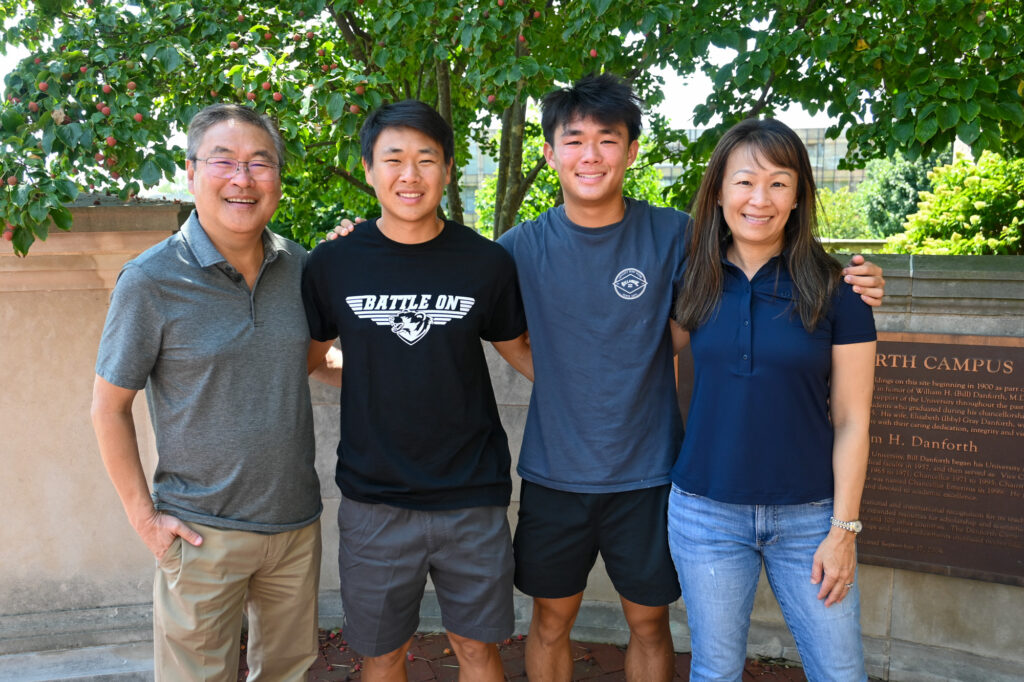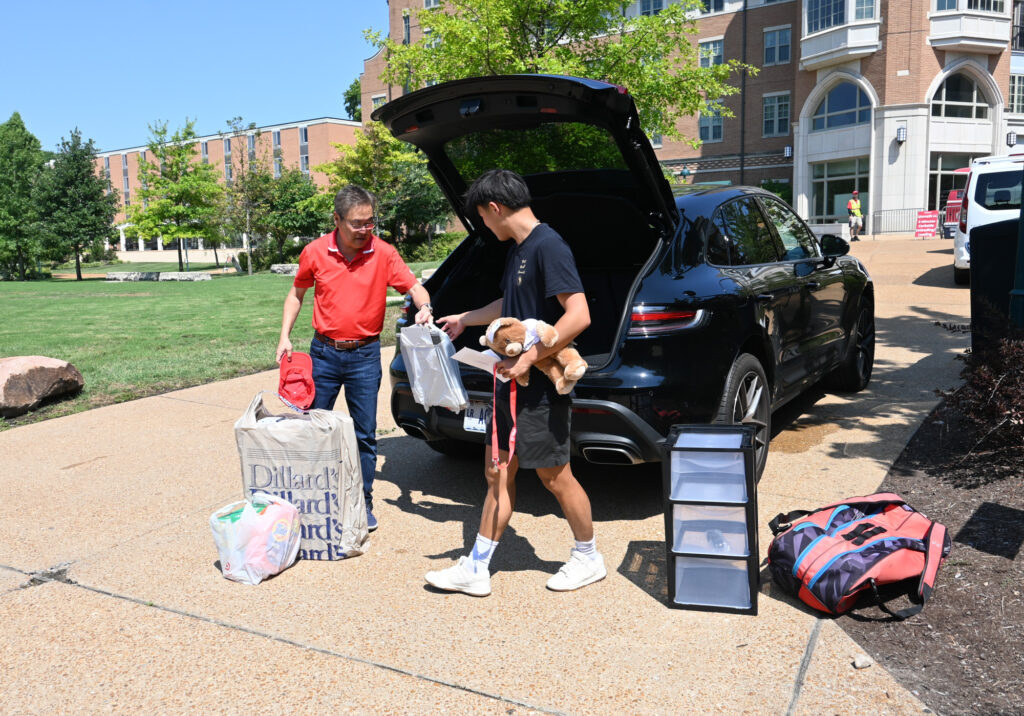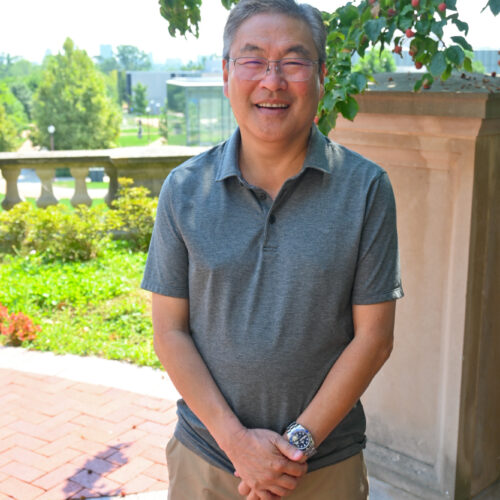By Emilee Murphree | October 30, 2025
When evaluating potential colleges as high school student in the mid-1980’s, Dean Yamamoto, BS ’87, JD ’90, favored WashU for three reasons: the university’s excellent reputation, the fact his cousin was also studying there, and perhaps most significant, St. Louis’ location more than 4,000 miles away from his hometown of Hilo, Hawaii.
After arriving on campus, Yamamoto discovered even more benefits of a WashU education. The diverse class offerings and student body fueled his intellectual growth and inspired his educational and career path.
After earning his undergraduate degree in civil engineering and law degree at WashU, he returned home to Hawaii where he founded Yamamoto Hetherington, a law firm in Honolulu specializing in project development and real estate.
As an alum, Yamamoto forged new connections with WashU, first as a donor and volunteer and eventually as a WashU parent. With two of his three children at WashU and a new role as Alumni Board of Governors chair, Yamamoto reflects on the ways that WashU continues to exceed his expectations.
What drew you to WashU as an undergraduate?
I wanted to attend a midsized private university where I could experience new things, meet new people, and expand my mind. WashU proved to be more than what I hoped it to be.

What kept you here for law school?
I applied and got into multiple schools, but when I thought about going other places, I kept comparing them to WashU and the experiences I had at the university. I realized what I was looking for in a law school was really all at WashU. I had unexpectedly become pretty fond of St. Louis, and I thought, ‘I wouldn’t mind spending another three years here as a graduate student.’ I’m really happy that I did.
Which professors had a significant impact on you?
A couple of folks really made an impression on me. My academic advisor, Tom Harmon, was a civil engineering professor. He was very approachable, and I appreciated his guidance throughout my undergraduate years. There was also Victor Farwell, one of the deans in Arts & Sciences. I got to know him well because he was the prelaw advisor for WashU. His interest in students wasn’t just steering them to a particular law school; he really cared about us. He made a big impact on me.
What aspects of your education and experience at WashU have proved most valuable?
I became a good problem solver because of my studies at the university. Far beyond that, the opportunity to hear different views and be challenged, and the exposure to a broad group of people, were really important.
The students I met were very curious and constantly questioning things I never thought about before. I came from a relatively rural area in Hawaii where life was pretty simple, and it was also pretty remote from the rest of the mainland U.S., and certainly the rest of the world. Coming to WashU was really eye opening in a lot of ways.
I met people from a broad spectrum of political viewpoints. I always thought the dialogue was very respectful and not antagonistic. When I talk to my son who’s been at WashU for four years, he echoes that. I think the culture at WashU promotes good discourse and allows folks to challenge each other but not a way that is polarizing. That was my experience, and I see that culture still exists here.

What is it like to be a WashU parent?
It’s great! My wife, Jodi, and I are thrilled that two of our sons decided to attend my alma mater. Our son Scott earned his bachelor’s degree in computer science last year, and he’s pursuing his master’s degree in computer science this year. Our son Spencer, who is a first-year student, is thinking about studying economics and possibly finance.
WashU does a great job with onboarding students. We’ve experienced it twice, and it’s a very easy process for what can be a very stressful time for parents and students.
How did you originally become involved as a WashU volunteer?
Many years ago, Jodi and I attended a WashU dinner in Hawaii, and I was reminded of all the things the institution did for me. I agreed to make a contribution and start volunteering by becoming a co-chair of the Eliot Society in Hawaii. Subsequently, I became chair of the regional cabinet in Hawaii and then was asked to join the Alumni Board of Governors (ABG) and the National Council for Student Affairs. I became ABG chair in July, and I’m happy to be taking on this new responsibility and role for WashU.
Do you have any goals as ABG chair?
My tenure is coming at an important time for our university. We’ve embarked on a new fundraising campaign called With You, and I view members of the ABG as ambassadors. All too often, folks who have attended a university with a large endowment tend to think the university is well-positioned for anything that can come at it. But a deeper look into how universities operate reveals that the successful ones rely heavily on ongoing philanthropic support. I hope our ABG members can carry that message out to a broader group of alumni.
What inspires you to continue volunteering and giving back to WashU?
I’m really inspired by seeing students enter WashU eager to learn, eager to experience new things, and to achieve something in this world. And I’m encouraged by the level of enthusiasm of alumni coming to ABG meetings and contributing.
I’ve learned the value of engagement, and that volunteering — and really philanthropy — is not a one-way street. Engagement with WashU has done a lot for me individually. It’s broadened my views and opened up a whole new network for me.
The more engaged people are, the more they develop deeper relationships. And when you move beyond superficial connections, good things really start happening.
In the last 20 years or so, I feel like I’ve continued to learn from WashU. I get an incredible sense of fulfillment and personal satisfaction from giving back to the university that gave so much to me and, by extension, to my family.
